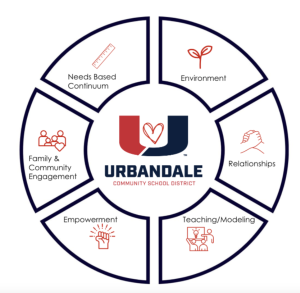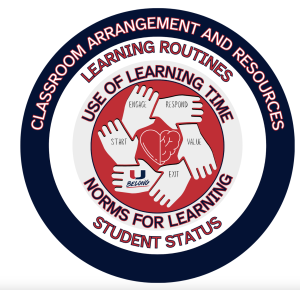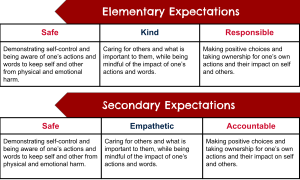Social Emotional & Character Education
ACHIEVING SUCCESS IN SOCIAL EMOTIONAL & CHARACTER EDUCATION
All students have social, emotional, and behavioral learning needs.
Social, emotional, & character education is the process through which children and adults acquire and effectively apply the knowledge, attitudes, and skills necessary to understand and manage emotions, set and achieve positive goals, feel and show empathy for others, establish and maintain positive relationships, and make responsible decisions. Research shows social, emotional, and character skills are enabling factors that allow students to execute learning and are the best predictors of life success.
Building future success starts with developing a child’s social, emotional, character, behavioral and academic aptitude from a young age. An extensive body of rigorous research demonstrates that “when social, emotional, and academic development are deliberately and thoughtfully interconnected, students benefit from learning experiences that enrich their understanding of academic content and strengthen their critical thinking skills” (Berman, et. al., 2018, p. 4). School environments that intentionally embed evidence-based social and emotional learning practices and programming show higher levels of academic achievement, positive behavior, self-management, and social competence.
A DISTRICT-WIDE FOCUS
Social, emotional, character and behavioral skills can be taught.
Urbandale School District is making social, emotional, and character education a focus.
- Implementation of Tier 1 social, emotional, and character education instructional materials
- District-wide implementation of Positive Behavior Interventions and Supports (PBIS)
- Implementation of an aligned social-emotional behavior assessment and data analysis
- Implementation of a needs-driven continuum of support and services
- District-wide student code of conduct coupled with transparency in supportive discipline
OUR VISION
Urbandale Schools will bring Social, Emotional, and Character Education to life for every student by intentionally modeling and providing instruction and opportunities for every student to thrive.
OUR MINDSETS
- We believe relationships are at the heart of everything and ensures that every individual in our learning community is safe emotionally and physically.
- We believe social emotional and character education is done best when there is a partnership with a student’s adults outside of school.
- We believe that social, emotional, and behavioral development has both physical and social influences and impacts.
- We believe students and staff benefit from both explicit and implicit instruction in social, emotional, and character education.
- We believe that social, emotional, and character education are as important as academics.
- We believe social, emotional, and character education should be engaging, meaningful, and affirming to support development over time.
- We believe that a continuum of supports is necessary to ensure students and staff have access to what they need socially and emotionally.
ACHIEVING SUCCESS IN SOCIAL EMOTIONAL & CHARACTER EDUCATION
Just as in academic learning, social, emotional, character skills learning is best achieved when schools utilize a variety of practices and programming to help all students acquire necessary skills. Similar to cooking, it is important to follow a recipe to ensure we get the product we desire, and focusing on a single ingredient or element of social, emotional, and character learning will not produce the outcomes we seek. As our schools begin to embed social-emotional learning programming, we will focus on six evidence-based ingredients to help students acquire social, emotional, and character skills.
ACHIEVING SUCCESS IN SOCIAL EMOTIONAL & CHARACTER EDUCATION
 Environment – adults focus on creating a safe, structured, predictable and positive environment.
Environment – adults focus on creating a safe, structured, predictable and positive environment.
Relationships – all staff and students feel a sense of belonging and connection. Adults consistently work to cultivate meaningful relationships with all students.
Teaching/Modeling – adults provide rigorous instruction to teach students the social and emotional knowledge and skills necessary to meet the demands of home, work, and civic life.
Empowerment – adults help students develop their sense of purpose, motivation, and future orientation.
Family & Community Engagement – family and community organizations are partners,and staff work diligently to engage them.
Needs-Based Continuum – adults focus on providing intensifying levels of evidence-based support that can be matched to student needs.
INSTRUCTIONAL MATERIALS
CLASSROOM ENVIRONMENT & CULTURE
 S.E.R.V.E. represents the Tier 1 SEC Practices all educators engage in to build relationships with students, create consistent routines that promote emotional safety, provide equitable opportunities to respond, and connect learning to engaging, affirming, and meaningful learning experiences for all students. S.E.R.V.E. organizes low-burden, high-impact practices to help educators increase their intentionality and impact on critical student outcomes like belonging, well-being, and engagement.
S.E.R.V.E. represents the Tier 1 SEC Practices all educators engage in to build relationships with students, create consistent routines that promote emotional safety, provide equitable opportunities to respond, and connect learning to engaging, affirming, and meaningful learning experiences for all students. S.E.R.V.E. organizes low-burden, high-impact practices to help educators increase their intentionality and impact on critical student outcomes like belonging, well-being, and engagement.
The 5 components of S.E.R.V.E. are:
Start
Engage
Respond
Value
Exit
BUILDING A BETTER U – EMPLOYABILITY SKILLS
UNIVERSAL SCREENER
Three times a year (fall, winter, spring) with parent/guardian permission the K-5 SAEBRS or 6-12 mySAEBRS is administered as a screener for social, academic, emotional behavior screener. Educators use the result from this screener to detect who may benefit from additional supports or instruction in the area of social, emotional, or academic behaviors.
DISTRICT-WIDE POSITIVE BEHAVIOR INTERVENTIONS & SUPPORTS
Staff, students, and parents/guardians had the opportunity to prioritize behavior expectations for all of Urbandale schools in order to identify three district-wide expectations. These expectations are modeled, taught, and reinforced across all common areas within our schools preschool through 12th grade.





